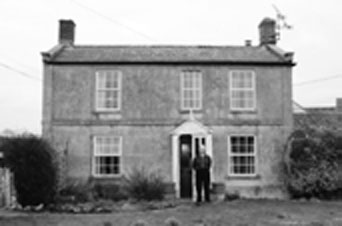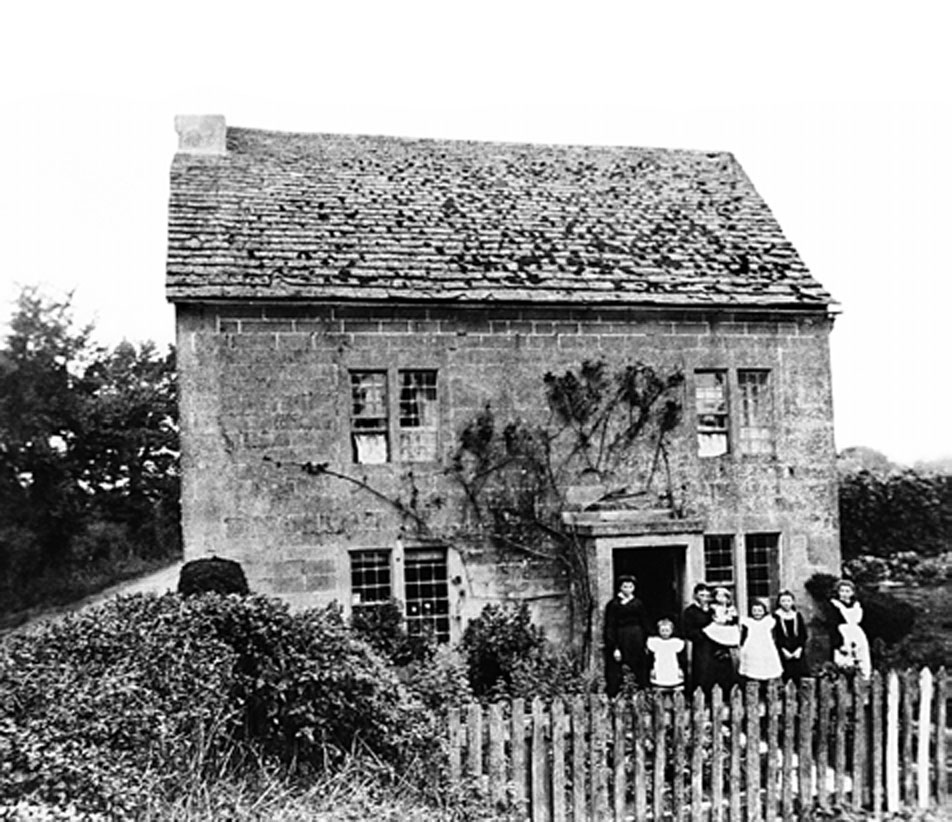Memories of Tytherton Lucas
As part of research for the Bremhill Parish History project, I have interviewed past and present inhabitants (names in bold) about their recollections of Tytherton Lucas.

Rex Grimshaw’s family moved to Curricombe Cottage in 1939. His father, Fred, farmed part of Curricombe Farm and from the age of 13 Rex joined him. They had 60 acres with 50 cows, pigs and hens which were kept for their eggs. They also had 4 acres of corn and kept 2 plough horses as well as having 2 old flat tractors. Rex’s wife, Shirley, was a wartime evacuee to the “big house”, Barnbridge. They bought Catbrook House (see photo above) for £900.
Brookside Cottage used to be 2 Cottages. The one at the back is the older. Bill Carter lived there and used to work for Rex’s father. Mr Cuzons lived in the front cottage. He was a war veteran with a motorbike and side car. His wife used the cottage as a Post Office. Rex remembered the counter with mesh above it. The door to the old Post Office has since been blocked up.
Fred Bryant lived at Gaston’s Farm and Frank Cottle lived at Manor Farm during the war before they were sold to Bob Davies. “Boxer” worked for Frank Cottle and “he used to drink Mrs Bryant’s dandelion wine and if he wasn’t sober enough to get home he would sleep under a hedge!”
Jack Welsh farmed at Westfield and kept a lot of pigs. Rex used to help feed the pigs and remembers the Dutch barn catching fire and burning the thatched roof on the cowshed. Then Commander Dixon lived at Westfield and ran a nightclub!
Miss “Tinkerbell” Livingstone lived at Broome Corner, now called Lucas House. She was a vicar’s daughter and drove an ambulance in London during the war. She had a sports car which she raced and used to give youngsters, like Rex, a ride.
Alfie Holder recollects working on the other part of Curricombe Farm. They had about 40 dairy cows and 40 youngstock. He lived in the farmhouse with his Uncle Jim (Salter) and Auntie Bren (nee Cleverley) from 1956 (age 14) to 1964. “It has walls 6 foot thick and Mr Cleverley had told Jim that it used to be a monastery because it is huge inside. The first floor has a fireplace at each end. They used to put the turkeys up in the attic before Christmas time.”
Verina Vanzillotti was born at No 2 Bosmere Cottages. Her father, Emilio Vanzillotti, came from Italy to England as a Prisoner of War and worked for Mr Cottle at Bosmere Farm tending the dairy herd. “Mr and Mrs Cottle had no children and were like parents to him. When Mr Cottle died, my father ran the farm with Mrs Cottle helping a bit. But she became unwell and when she couldn’t look after herself, she moved in with us.
My father never took a holiday. We all had to muck in with the hay making. My Mum helped with the milking as well as looking after us and old Mrs Cottle. It was instilled into all of us as children – we were all workers. From the age of 6, every school holidays, I used to go potato picking for Mr Davies at Manor Farm and was paid 6 pence per crate. It was all done by hand, walking behind the tractor ploughing them up. And then when machines came, we would stand on the back to pick them out. Then Mr Davies went into asparagus in a big way. We used to cut and bundle them each evening and then Mr Davies would take them to market in Bristol early the following morning.”
Brigadier George Powell came to Tytherton Lucas in 1964, as a Major still serving in the army, in the 1st Queens Dragoon Guards. “Coggswell cost £5,000 and £1,000 for the stables. It was my favourite house. We had three horses between myself, my wife Charmian, and our two sons. I hunted with the Beaufort for 30 years. We bought The Beeches next door for £2,000 for my youngest son, Simon.
“A previous inhabitant of Coggswell was a gentleman farmer called Thomas Crook (1749 – 1821). Thomas could get oxen fit and ready for work before others because he fed them boiled potatoes! Oxen were used to do all the work on the farm. Thomas Crook was also a horse breeder. “Skyscraper” won every race, including the Derby in 1789. He was owned by his friend, the Duke of Bedford, but he couldn’t get Skyscraper to settle and serve the mares. So Thomas Crook brought him to Coggswell where he settled and was very successful.”
Pam Sawyer told me that her husband, Doug, was born at Field Farm in 1928. “He went to the Moravian church school in East Tytherton. I think he went in the pony and trap with Serena Lamb from Coggswell. You can picture the scene of them clopping along the road to school.” “Doug took over the farm from his father when he was 21 and had a herd of 40 or 50 cows. The land was quite scattered, so we had to take the cows down the road to the fields. There was a bus twice a week through here which we thought was quite good. But we had to take care if the bus was coming and not let the cows out otherwise the bus had to trundle up the road behind the herd.”
Dr Christopher Kent’s mother-in-law, Ruby, had moved to The Laurels in 1934 when she would have been about 15 years old. Her father, Eli Baker, worked for Bob Davies at Manor Farm and Gastons Farm tending the herd of Ayrshire cows and they lived at Manor Farm Cottage (now Broome House), as a tied cottage. Eli and his wife “Dolly”, acquired The Laurels from Tommy Freeguard. Tommy was a general handyman worker who never married and as he became older and more infirm, Dolly used to make him hot meals and kept an eye on him. Eli and Dolly were saving up to buy The Laurels but to their surprise when Tommy died he left the cottage to them. They had never expected this. Before that it was a tied cottage to the Crook family.
The photograph below of The Laurels shows the Hamlyn family who rented the cottage at the end of the C19th.
Memories of Tytherton Lucas would not be complete without a mention of The Drunken Duck hosted by Jane and Stephen Cook in the garden of Broom House. Visitors bring donations for the bar and the “landlord” acts as judge and jury administering fines for any local misdemeanours! Aptly named after the many ducks to be found where the rivers Avon and Marden merge in Tytherton Lucas, the Drunken Duck has welcomed visitors most Sunday evenings, apart from during lockdown, since 2006.
From interviews with Helen Stuckey

